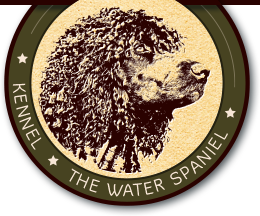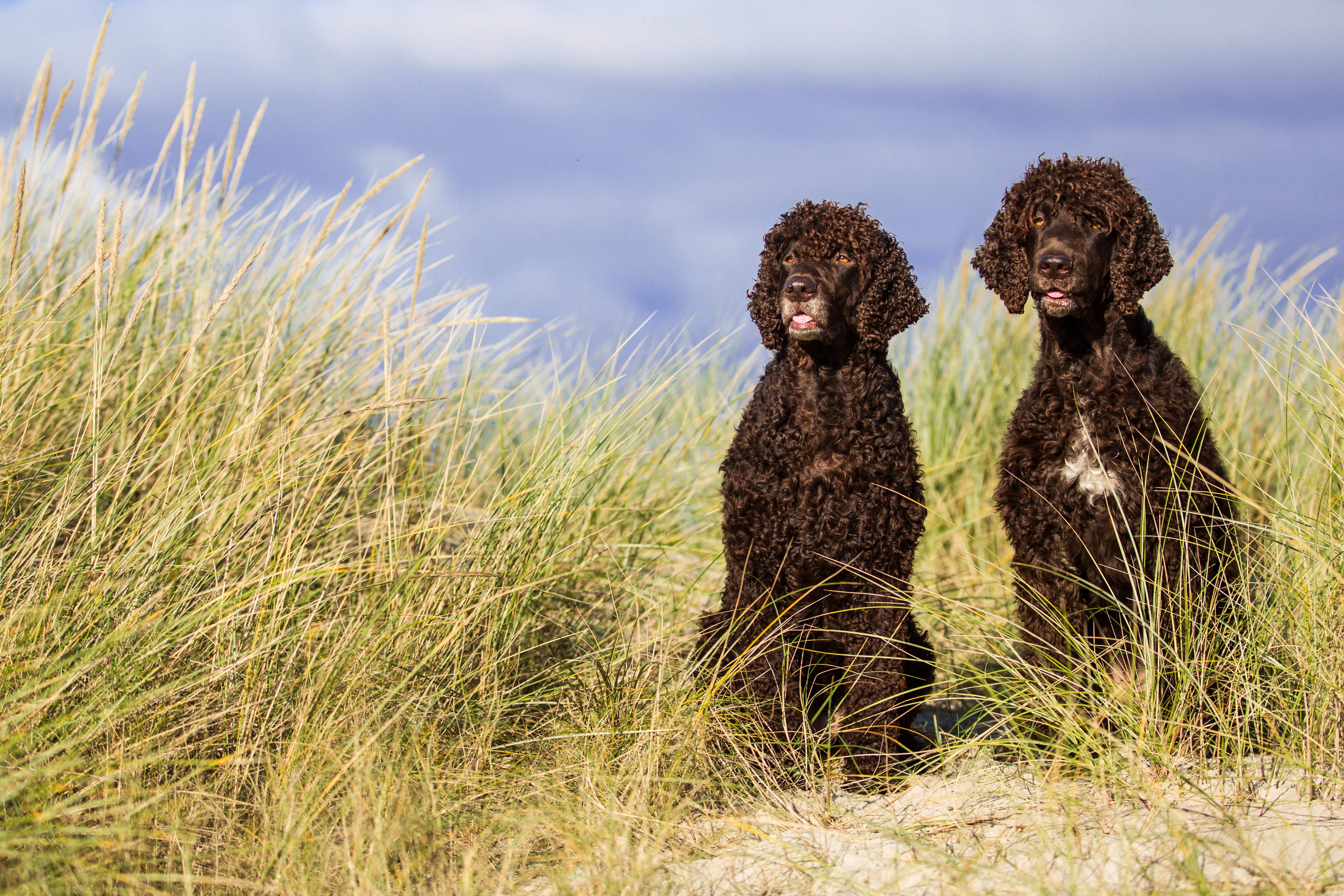Health
The IWS is still a rare dog and is only favoured by lovers of the breed.
Very often the dogs are in the hand of hunters and therefore the animals have to be healthy and robust. So we rarely found deseases of civilisation at the Irish Water Spaniel.
BUT we should not close our eyes at the relatively high inbreeding factor in these rare breed. Again and again there are trends in the breed and an overuse of Champion males. Many “breeders” follow the tide and inbreeding of half-litterbrothers/sisters of the second and third generation became common. The consequence is the significant high part of cancer desease and decrease of longevity in the Irish Water Spaniel breed. The responsible breeder will have a deep look as possible at a low inbreeding factor (CoI) on future mating. Also the amount of Champion male offsprings should be limited.
Information of the CoI value of the IWS you can find on the Netherland database. IWS database
Unfortunatly not all countries/breeders fill in the breed information, so there are still lost animals.
The Sporting Irish Water Spaniel Club in conjunction with the Irish Water Spaniel Association are collaborating to build up an ongoing picture of the longevity of the Irish Water Spaniel and to identify and monitor the occurrence of any serious health issues:
IWS Longevity Report IWS Longevity Report
If you want to join in your IWS please send an email to lewisj@btinternet.com or write to John Lewis, 17 Kings Walk, Shoreham Beach, Shoreham by Sea, Sussex, BN43 5LG and order the Health Survey Questionnaire.
The all dog breeds for better comparison: All Dogs Longevity Report
DRUG WARNING
For more than ten years there have been regular reports, albeit anecdotal, of serious adverse reactions by Irish Water Spaniels to the commonly prescribed POTENTIATED SULPHONAMIDE group of antibiotics. This type of antibiotic proved to be both effective and economic in disease management following the Second World War. SULPHAMETHOXAZOLE and TRIMETHOPRIM are used in combination for their synergistic activity and known by the generic term CO-TRIMOXAZOLE or CO-TRIM. C0-trimoxazole was commonly prescribed by General Practitioners until the autumn of 1994 when it was withdrawn for human use, except in exceptional circumstances. This drug does, however, continue to be a popular choice in veterinary medicine.
It is therefore advisable for all owners of the breed to alert their Veterinary Practices and Boarding Kennels to the risks involved. The breed would appear to have lost several animals, world wide, through the side effects of Potentiated Sulphonamides, and many more dogs have been rendered seriously ill until treatment was withdrawn or altered.
The following brand names, in addition to the generic CO-TRIMOXAZOLE, should be avoided or treated with caution when prescribing for Irish Water Spaniels: TRIBRISSEN, TRIMACARE, DELVOPRIM, CHANOPRIM, DUPHATRIM ,TRIMEDOXINE, NORODINE, BORGAL SULPHADIOXINE TRIMETHROPIM, ZAQUILAN SULPHADIMETHOXINE BAQUILOPRIM, SULFATRIM 80/400 (NETHERLANDS), DERAMAXX (USA), DERACOXIB (USA)
The published side effects for Co-trimoxazole are:
- Vomiting
- Purpura
- Diarrhoea
- Leucopenia
- Glossitis
- Thrombocytopenia
- Rashes
- Megaloblastic Anaemia
- Epidermal Necrolysis
- Pseudomembranous Colitis
- Pancreatitis
- Jaundice
- Eosinophilia
- Hepatic necrosis
- Agranulocytosis
- Erythema Multiforme – (including Stevens-Johnson syndrome)
- Source: British National Formulary, September 2005 Nausea Granulocytopenia
Toxic and sickly Ingredients:
- Acetylsalicylsäure (z.B. Aspirin oder ASS)
- Alcohol (Ethanol)
- Lead
- Ethylenglykol (Frostschutzmittel)
- Hashish (Tetrahydrocannabiol)
- Coffee (Coffein)
- Garlic oder Garlicextract (Allicin)
- Macadamianuts
- Metaldehyd (Snailpoison)
- Nicotine (Tobacco)
- Fruitstone (z.B. Apricots, Plums, Peach or Bitter Almond)
- Quicksilver
- Chocolade, dark (Theobromin)
- Black Tea (Coffein, Theophyllin)
- Strychnine * Thallium
- Grapes, Raisins
- Xylit alias Xylitol oder Lignit (e.g Icecandy, Diabeticproducts or Toothpaste)
- Onions (N-Propyldisulfid)
Sickly animalfeed:
- Milk und Milkproducts (adult Dogs)
- Raw Starch (e.g. Potatoes, Rice, Noodles or Cereal)
- Bones (boiled Bones neigen maybe shiver, fleshy bones maybe hurts inner organs
- Cabbage (creates gas) * Raw Protein (creates indigestion)
- Legume (z.B. Lentils, Beans, Chickpeas und Soyaproducts maybe crates indigestion)
- Cold food (maybe create vomit)
Toxic house plants:
- Bogenhanf / Bajonettplant (organic Acid, haemolytic Sapogenin)
- Brunfelsie
- Dieffenbachia (Saponine, Calciumoxalatcrystals, cyanogene Glykoside and Alkaloide)
- Dragon tree (Saponine)
- Ivy (Saponine)
- Monstera (Calciumoxalatcrystals, Oxalacid)
- Gum tree
- Philodendron (Calciumoxalatcrystals, Oxalacid)
- Fir needles (Terpentineoil)
- Christmas star
Toxic garden plants:
- Amaryllis
- Azalea (Diterpene)
- Boxtree (Alkaloide (Buxin))
- Crown-of-thorns (several Poisons)
- Yew (Alakloide (Taxin))
- Angel trumpet (Scopalamin, L-Hyoscyamin and Atropin)
- Foxglove (Glykoside)
- Golden rain (Quinolizidin-Alkaloide (Cytisin))
- Lily of the valley (Glykoside)
- Mistletoes (Viscotoxine (Polypeptide), Viscumin (Lectine))
- Oleander (Glykoside (Oleandrin, Neriosid))
- Rhododendron (Toxine (Rhododendrin, Rhododendrol, Andromedotoxin, Ursolacid, Arbutin, Tannin and Gallusacid))
- Thuja (essential Oil, Bitter constituents and tannins)

